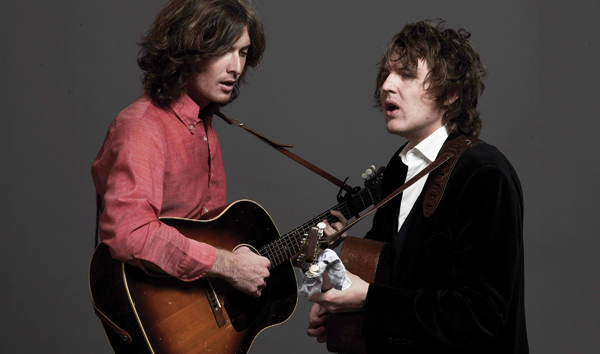Testing The Limits of Minimalism on the Road
The Milk Carton Kids – comprised of Kenneth Pattengale and Joey Ryan – are ready to take 2013 by storm. The Ash & Clay, the duo’s third album, was released last month on ANTI- Records. It is riddled with high-lonesome whistles, as the boys flawlessly deliver handsome, hybrid folk songs. Tracks either flare up or lurch forward, and do so beautifully. Even though they have an ambitious tour of the States in their sights, currently the Kids are in Europe promoting the release. But for some reason, they aren’t really concerned with the grueling demands of touring; their shows last year with Old Crow Medicine Show taught them all they needed to know.
“[Old Crow] have been on tour for more than a decade and the communal spirit they embody has kept them going. Since our operation is so small, it’s easy for it to become insular to a fault,” Ryan states. He is also as introspective when examining Milk Carton’s own tour hardships. “We were tested, in our resolve, to put on our show unaltered in some very compromising circumstances,” he continues.
“We’ve never plugged in our guitars and the technical limitations of that approach prevent us from turning up amplifiers to overpower the crowd with our sound.”

And that was just the beginning. “Some of Old Crow’s crowds enjoyed beer and shouting a lot, so we had some of the most trying shows of our career in just two weeks. But their crowds also appreciate lyrics and guitar picking, so in places like Atlanta and Knoxville we had some of the best shows of our entire career.” And it’s not hard to see why audiences couldn’t get enough of them.
The sheer, shy vocals and elegant guitar work presented on their first two records Prologue and Retrospect are at their finest on The Ash & Clay, as the Kids continue to experiment with their creative process. Their live show is a fine testament, as both men bravely adorn only their instruments and vocals to win over skeptical crowds. But to Ryan, there seems to be strength in a lack of numbers.
“Writing The Ash & Clay afforded us the first real opportunity to push the limits of what can be conveyed with just two voices,” he says.

“Emotionally, harmonically, and regarding subject matter, this album seems much more expansive than our last. When we recorded Prologue, we had been a duo for two months. The Ash & Clay sessions came a year and a half of living together in various vans, performing 175 shows or so, and developing a deep friendship.”
Perhaps this intense approach to their artistry is why they are compelled to share most of their music for free – a maneuver that has proven tricky for artists in the past. “I’m wary of contributing to the dangerous idea that music ought to be free. To the extent that musicians and those we work with support themselves on their art, it’s a tragedy that so many feel entitled to own it without contributing to its creation,” he contemplates. “But the other side of that is also dangerous: to the extent that recorded music is treated like a product it is cheapened and devalued by those who sell it, which goes some of the way to explaining people’s ambivalence about stealing it.”

Ryan goes on to thoughtfully evaluate his stance. “For us, having a free option available is a bit of an experiment, testing the line between art and commercialism. But what we see are a great many people, especially those younger than we are, excited to listen and to share what is clearly being held up as art first and a product second. With the release of The Ash & Clay without a free option, the experiment continues and we’re ever conscious not to devalue the music we’ve made by pretending that its purpose is to be bought or sold.”
Ryan’s opinion represents the dilemma most artists face when it comes to trying to place a price on what they create. But to him, it’s about sticking to your intuition and being true to yourself regardless of how unconventional your approach is. Even though they are armed only with a 1951 Gibson J-45 and a 1954 Martin 0-15, as well as their voices, The Milk Carton Kids aren’t afraid to tear down their minimalist label brick by brick – and do so in stride. “[The label] suits us fine, I suppose,” Ryan ponders. “But I think we strive to contradict it entirely.”
photos by Robert Ascroft
